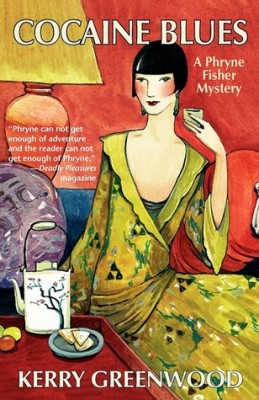
It’s been pretty quiet on the Book Report front for a while now, and there are several good reasons for that, namely: (a) a re-read of The Lord of the Rings while on holiday in New Zealand because appropriate; followed by (b) a re-read of some Agatha Christie faves, also while on holidays, because it’s holidays and I don’t want to read anything depressing and/or that I don’t already know the ending of; followed by (c) the following.
Three weeks ago, I was home alone and bored and trying to think of something to watch on Netflix, so I thought I’d give Miss Fisher’s Murder Mysteries a go. I knew the basic premise but hadn’t been interested, but Mallory Ortberg loves it which is a good sign. Anyway, putting aside the admittedly amazing costumes, the TV show (or at least the first episode, which is the only one I’ve watched all the way through) has very little to recommend it except for the premise. So I did what any reasonable person who is me would do: I sat myself down and read all 20 books in under three weeks. That’s one a day for those playing at home. (Note: it is definitely necessary, or at least strongly preferable, to read these books in the order in which they were published.)
I am breathlessly in love with these books in the way that only a teenager discovering Twilight can usually be. (Do teenagers discover books any more, or do they just osmote them somehow from the Cloud?) I mean, I’m perfectly aware that, objectively, they have flaws, the most notable of which is in their continuity, which I think may get worse as they go on. (This is to be expected when there is presumably mounting pressure on the author to publish as quickly as possible.) But I’m also aware my husband is not god-like and flawless, and I still love him, so.
For those who have been living under a literary rock, here’s the premise. The Hon. Miss Phryne Fisher, the mythically wealthy daughter of a minor peer, sets sail from England where she has been living with her despotic father, and establishes herself in 1920s Melbourne as a private detective. There she befriends a number of persons including a Detective Inspector of police, a couple of communist cab drivers, and a woman who becomes her maid-slash-companion. As the books go on, she adds more people to her household, including servants, children, and animals. There’s loads of flapper fashion (my newly-expanded vocabulary includes words like “cloche”, “fillet” – which is a kind of head decoration – “bandeau”, and “camiknickers”), murder/kidnapping/violence, and sex. I mean, there are sex scenes in most, if not all, the books, but when it’s not actually happening Phryne also talks about it, thinks about it, and uses it to get what she wants.
In many, many ways, these books are an idealisation of the 1920s. Except when murders are happening, everyone – gay, straight, white, non-white, cop, prostitute – pretty much gets along, and the few who don’t play by those rules always get some kind of comeuppance. Phryne’s communist buddies think she’s a beaut sheila for a capitalist. She expands the horizons of those around her and everyone’s merrily converted to her liberal ways, or at least to tolerance of them, without a squeak of protest. Unlike most traditional detective stories, there are often criminal characters who are not morally judged, and who are let off the hook by Phryne at the end (since she doesn’t feel obliged to tell the police everything she knows). There is poverty, but Phryne swans through it scattering shillings to urchins and single mothers. And the author is a frequent quoter of both Wallace Stevens and Gilbert and Sullivan, so however shallow the politics, she has my heart in her hand.
There is an elephant in the room, which is that the books start in 1928 and progress with a geological slowness through into 1929, and I DO NOT KNOW what’s going to happen to all those gowns and jewels and bottles of magnificent champagne once they get to October. Phryne solves her own problems and everyone else’s with money. There are HINTS that she has her money invested in rock-solid things (I have no idea about investing so I can’t remember exactly what) so she might ride it out, BUT STILL. Do I need to prepare myself for some terrible images of dying children that Phryne is powerless to help? The WHOLE POINT of these books is the glamour (she has a bath made of solid malachite, for example) and I just can’t imagine them being entertaining if all the characters are warming their hands over garbage bin fires and discussing the best ways to cook rat. Obviously, this exposes the extreme shallowness underlying the novels, but I can’t help it. Gin and hats 4 eva plz.